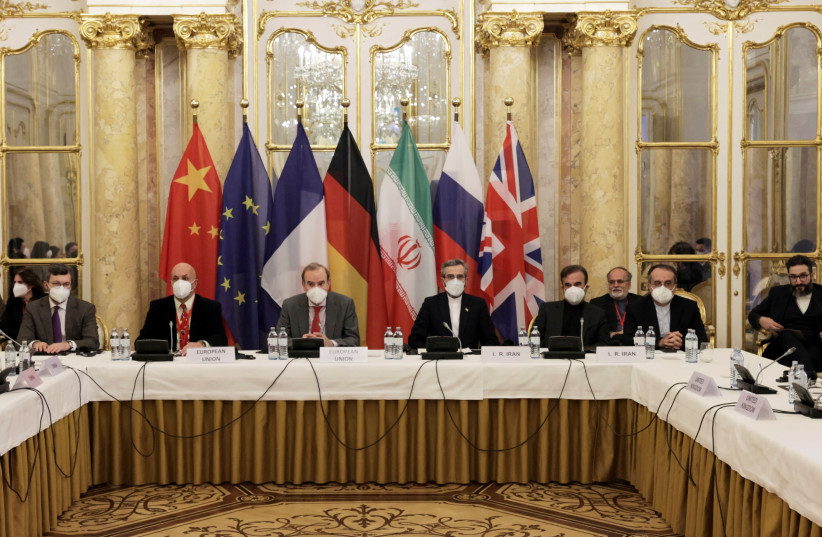‘Israel has suffered for years from a lack of strategy,” attested Amos Gilad in a recent radio interview. The former general provided examples with conviction, confidence, and an abundance of self-certainty. The problem is, he was wrong on three key counts: The US, Iran and the Palestinians.
From day one, Gilad opposed the American withdrawal from the Iran nuclear deal, the Joint Comprehensive Plan of Action (JCPOA), and implied that Israel’s policy focused solely on that goal. He reiterates this view today with vengeance.
In reality, had Gilad’s 2015 position been adopted and had the US insisted on the half-baked nuclear deal, Iran’s extreme Islamic regime would now be a legitimized member of the international community and cushioned by billions of terror-facilitating dollars. Worse, as president Barack Obama acknowledged, the ayatollahs would have a permitted and paved path to a nuclear arsenal in less than five years.
Convincing the Americans to withdraw from the folly-filled JCPOA, repeatedly breached by the ayatollahs, was not the sole slice of Israel’s strategy to prevent a nuclear Iran. In fact, former chief of staff, Gadi Eisenkot, revealed last week that “had Israel not implemented a multifaceted strategy of primarily covert operations, Iran would have become nuclear seven to 10 years ago.”
Those covert operations were part of a wide-ranging strategy, largely kept secret. Today, short-sighted and desperately irresponsible politicians periodically leak reports of alleged Israeli strikes in Iran. Clearly intended to help the standing of a plummeting prime minister, these leaks can compromise Israel’s security.

Gilad cynically criticized Israel’s former prime minister for confronting the former US president on the latter’s flawed Iranian policy, stating that it compromised the strategic alliance between the countries.
“Had Israel not implemented a multifaceted strategy of primarily covert operations, Iran would have become nuclear seven to 10 years ago.”
Gadi Eisenkot
However, in reality and despite disagreements with president Obama, the relations between the states strengthened and Congress approved an unprecedented $38 billion strategic agreement with Israel at the height of tension between the leaders. Common national values and vital interests usually overcome petty personal grievances.
More criticism
IN RECENT years, Gilad and other disgruntled former generals have (mis)counted and criticized Israel’s intended purchase of naval ships and submarines. The criticism caused a delay in the purchase of an essential submarine, ultimately costing Israel billions when the purchase was belatedly made.
The strategic importance of the economy in the rise and fall of regional and even great world powers is often overlooked.
This rise of Israel’s economy, from a 50th GDP per capita global ranking in 1999, to 19th in 2019 (surpassing Britain, France and Japan) has been a critical component in Israel’s capability to confront Iran.
A powerful economy enabled Israel’s development and acquisition of sophisticated weapons and the use of advanced and actionable intelligence. It also facilitated international relations with countries that never had diplomatic ties with the Jewish state.
At the same time, Iran and its authoritarian regime suffered from a stagnant economy. Their GDP per capita was stuck at about $3,000 for over 20 years. They could not properly utilize their natural and human resources, and were hammered by the US-led economic sanctions that climaxed under president Donald Trump.
This year has unfortunately been a good economic year for the tyrants in Tehran. With the easing of sanctions and rise in oil prices, Iran’s GDP grew by about 5%. Most of the additional revenue is allocated to terrorism and enhancing Iran’s nuclear program.
Turning to the Palestinians, Gilad preached how “peaceful” Mahmoud Abbas is and emphasized the urgency of negotiating with the 87-year-old PLO leader. He capped the criticism by taunting that “we were told stories that we can make peace in the Middle East without the Palestinians.”
In reality, that is exactly what happened.
In the summer of 2020, backed by its American ally, Israel signed the Abraham Accords with the UAE and Bahrain. Sudan, Morocco and Kosovo soon followed suit, and Saudi Arabia agreed to permit Israeli flights above its sovereign territory. Those peace accords and strategic achievements have changed the Middle East for the foreseeable future. They were made possible by seasoned statesmanship who bypassed Palestinian rejectionism and overcame their misperceived veto power.
The historic peace pacts with strong Muslim states which, like Israel, view Iran’s radical Shi’ites as a threat, were largely facilitated by the wise withdrawal from the dangerous nuclear deal. These peace pacts proved that time, for the first time, is not necessarily on the Palestinian side. Most importantly, the Abraham Accords, accompanied with seasoned leadership, can help confront the imminent threat of a nuclear Iran.
The writer is an author most recently of Targeted Killings, Law and Counter-Terrorism Effectiveness and CEO of Acumen Risk Ltd.
